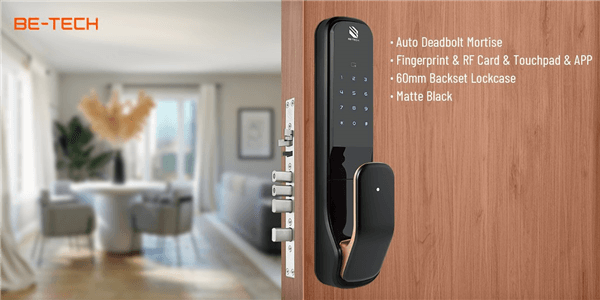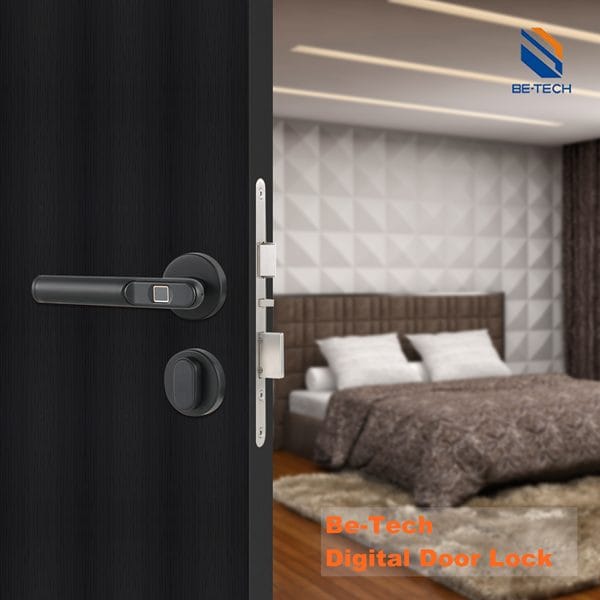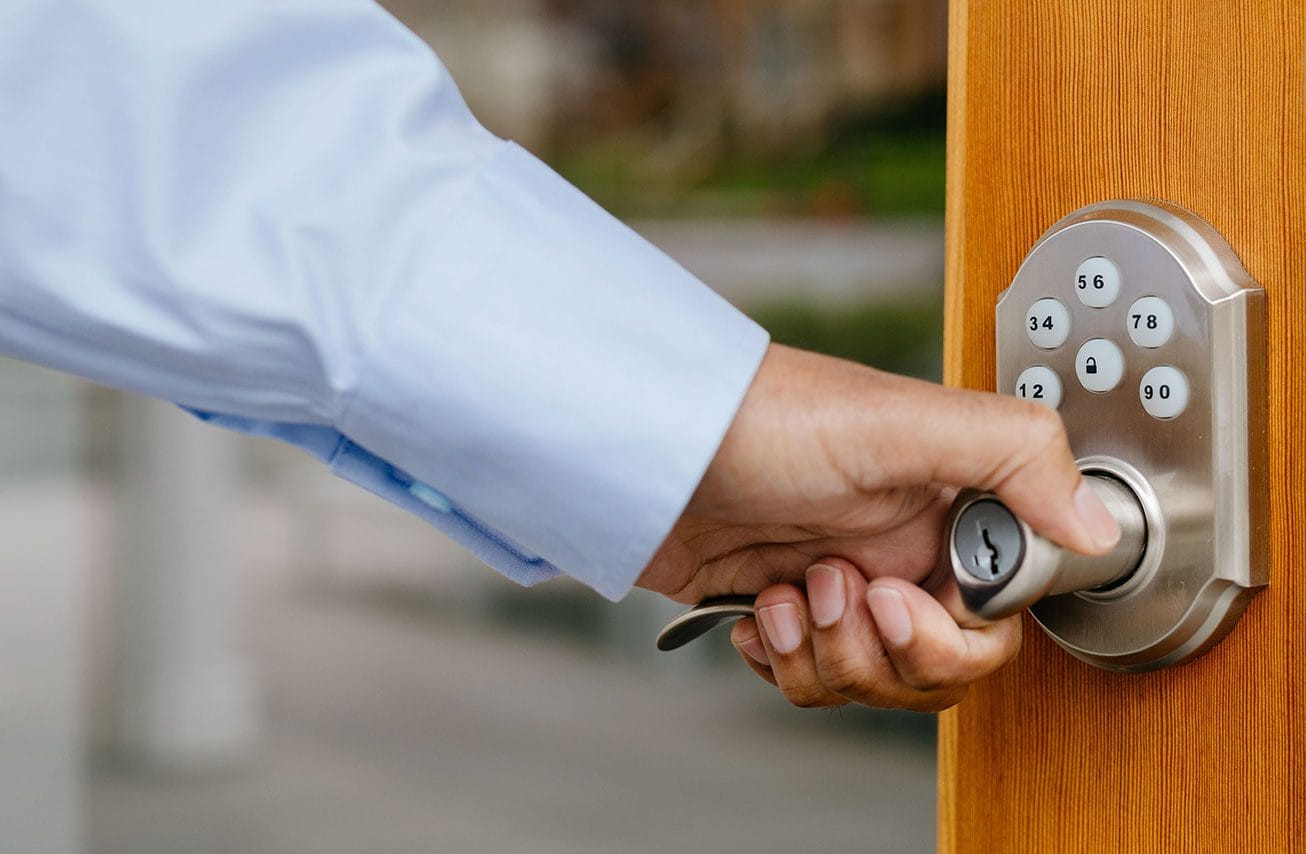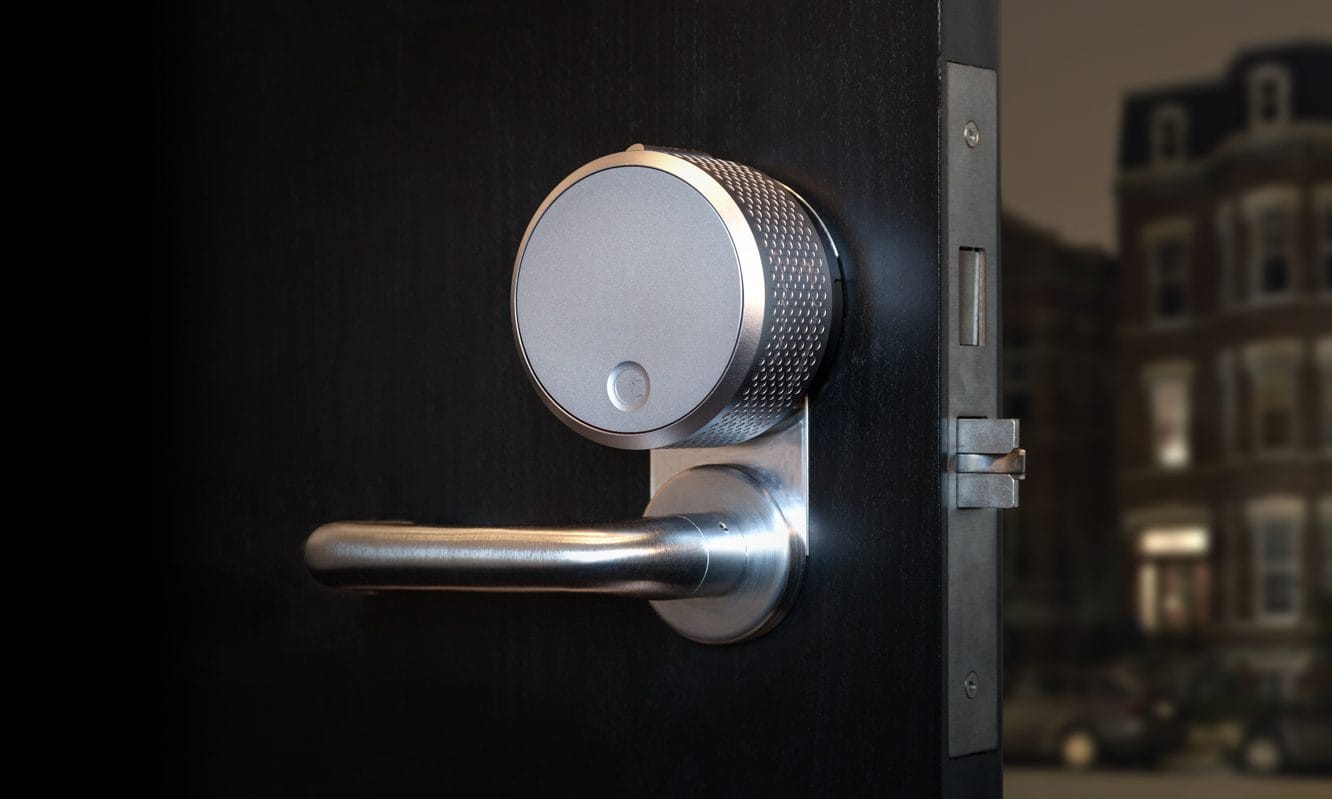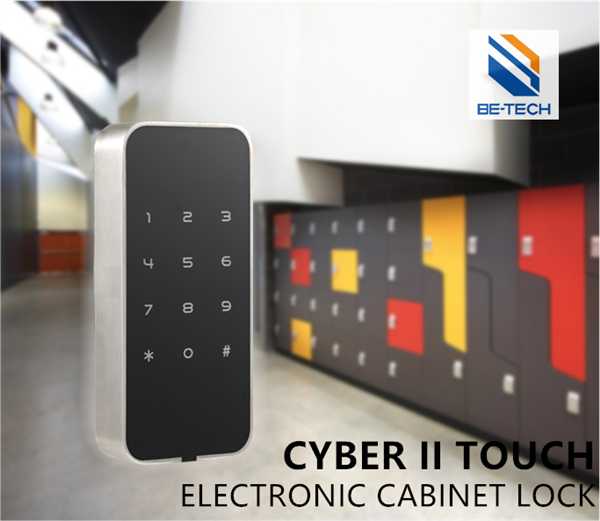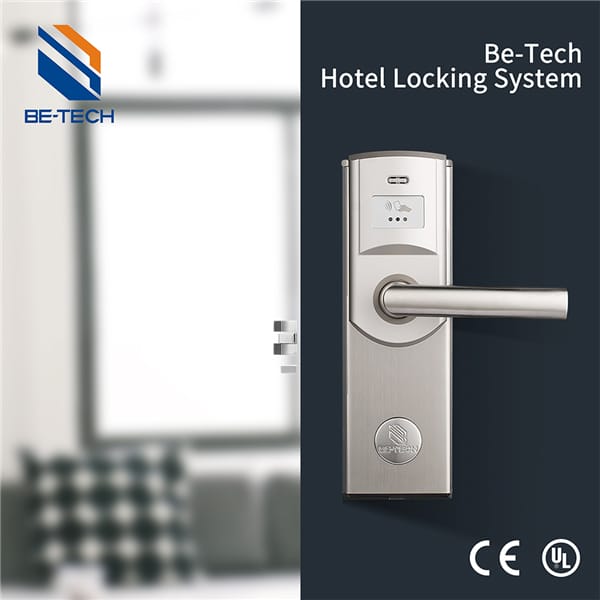When securing doors in homes, hotels, and businesses, it is essential to understand the various types of locks available. Among these, bolts and latches are two common options. Although both serve to keep doors closed and secure, they differ significantly in their mechanisms and applications:
- Bolts provide a stronger level of security as they lock into place with a solid metal piece.
- Latches, on the other hand, are typically easier to operate but offer less security than bolts.
In this article, we will explore the unique features of each type of lock, discuss their various forms, and identify the best use cases for both in relation to the hotel industry and offerings from Be-tech Locks.
Key Differences Between Bolts and Latches in Hotel Security
Understanding the differences between bolts and latches is crucial for enhancing hotel security. Here’s a breakdown of their operations and applications:
Bolts
Operation: Bolts are manually operated locking mechanisms that require sliding a metal bar into a strike plate or keeper.
Application: Ideal for external doors or gates where maximum security is essential. They provide robust protection against unauthorized access.
Security Features: Bolts are often designed to resist tampering and forced entry, making them suitable for high-risk areas in hotels.
Latches
Operation: Latches are spring-loaded devices that automatically lock into place when the door is closed.
Application: Best suited for interior doors where convenience is prioritized. They can be easily opened by turning a knob or lever.
Security Features: While convenient, latches may not offer the same level of security as bolts; therefore, they should be used in lower-risk areas.
Types of Door Bolts
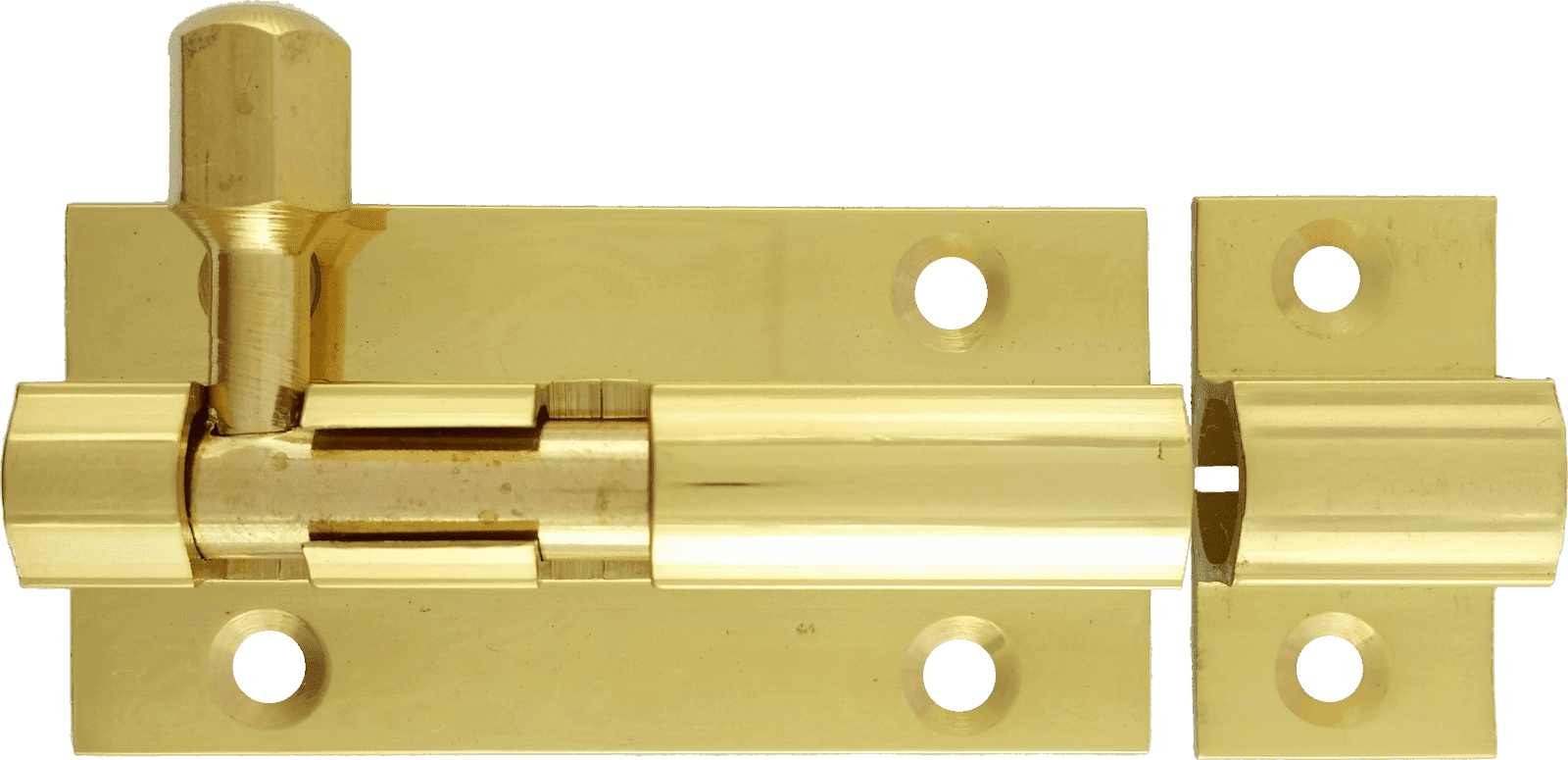
When it comes to securing doors, several common types of bolts are available, each designed for specific applications and offering unique features:
Barrel Bolts: Barrel bolts are a type of locking mechanism commonly used to secure doors and gates. They are simple yet effective devices that enhance security by providing an additional locking point.

Flush Bolts: Flush bolts are a type of locking mechanism that enhances the security of doors, particularly in double door configurations. They are designed to be recessed into the door, allowing for a clean and unobtrusive appearance while providing effective locking capabilities.

Surface Bolts: Surface bolts are a type of locking mechanism designed to secure doors, gates, windows, and cabinets. They are mounted directly on the surface of the door or frame, making them easy to install and operate. Surface bolts provide an additional layer of security, ensuring that doors remain closed and secure when not in use.
Deadbolts: Deadbolts are a type of locking mechanism designed to enhance the security of doors. Unlike traditional spring-latch locks, deadbolts utilize a solid metal bolt that extends into the door frame, providing a more robust barrier against unauthorized entry.
Barrel Bolts vs. Flush Bolts
When considering security options for hotels, it’s essential to understand the differences between barrel bolts and flush bolts. These two types of locking mechanisms serve different purposes and offer unique benefits.
Barrel Bolts
Barrel bolts are straightforward yet effective security devices ideal for various applications within a hotel setting. They consist of a metal rod that slides into a hole in the door frame. Here are some key features:
- Installation: Easy to install; surface-mounted.
- Visibility: Clearly visible when engaged.
- Cost-Effectiveness: Generally less expensive than other options.
These characteristics make barrel bolts suitable for:
- Interior doors (rooms or closets)
- Storage areas (sheds or maintenance rooms)
Flush Bolts
In contrast, flush bolts provide a more discreet locking solution. Designed to be recessed into the edge or face of a door, they are commonly used on double doors, especially the inactive leaf. Key features include:
- Types:
- Manual: Retracted using a small lever.
- Automatic: Engages as the active door opens or closes.
Flush bolts excel in providing:
- A sleek appearance that enhances hotel aesthetics.
- Enhanced security by securing both the top and bottom of double doors simultaneously.
| Feature | Barrel Bolts | Flush Bolts |
|---|---|---|
| Installation | Easy, surface-mounted | More complex, recessed |
| Visibility | Visible when installed | Hidden when door is closed |
| Cost | Generally less expensive | Typically more expensive |
| Versatility | Fits various door sizes | Often specific to door type |
| Repair | Easier to replace or repair | Can be difficult to repair |
| Aesthetics | More noticeable | Sleek, minimalist appearance |
| Security | Good for basic security | Enhanced security for double doors |
Choosing between barrel bolts and flush bolts depends on your hotel’s specific needs. For basic security solutions at a lower cost, barrel bolts are ideal. However, if aesthetics and enhanced security are paramount—especially for double doors—flush bolts may be the better option.
“The right door security solution balances functionality, aesthetics, and budget constraints to provide peace of mind for hotel owners.”
By carefully evaluating these factors, you can select the most appropriate locking mechanism to enhance both safety and style in your establishment.
Barrel Bolts vs Surface Bolts
When it comes to securing hotel doors, choosing the right locking mechanism is crucial for ensuring guest safety and convenience. Two popular options are barrel bolts and surface bolts, each offering distinct advantages.
Barrel Bolts
- Description: Barrel bolts feature a cylindrical design that slides into a catch plate mounted on the door frame.
- Installation Flexibility: They can be installed both horizontally and vertically, making them versatile for various door types in hotels.
- Security Benefits: Their recessed design typically offers higher resistance to forced entry, making them an excellent choice for securing storage areas or service entrances within hotels.
- Aesthetic Appeal: Available in multiple sizes and finishes, barrel bolts can complement a hotel’s interior design while providing reliable security.
Surface Bolts
- Description: Also known as slide bolts, surface bolts attach directly to the face of a door.
- Visibility: Their exposed nature makes them easily accessible for quick locking and unlocking, which can be beneficial in high-traffic areas.
- Design Options: Many surface bolts are designed with aesthetics in mind, making them suitable for prestigious hotel properties where appearance matters.
- Potential Drawbacks: While surface bolts are easy to install, their visibility may make them more susceptible to tampering compared to more discreet options like barrel bolts.
| Feature | Barrel Bolts | Surface Bolts |
|---|---|---|
| Installation | Flush-mounted | Surface-mounted |
| Visibility | Less visible | More visible |
| Aesthetics | Generally simpler | Can be decorative |
| Security | Higher resistance to forced entry | Visible deterrent |
| Versatility | Horizontal and vertical use | Primarily vertical use |
Ultimately, the choice between barrel bolts and surface bolts depends on specific hotel needs regarding security, aesthetics, and ease of use. Both options can effectively enhance door security when properly installed and maintained. For hotels looking to upgrade their locking systems, considering modern alternatives like electronic locks may further improve guest safety and operational efficiency.
Flush Bolts vs Surface Bolts
When selecting locking mechanisms for hotel doors, understanding the differences between flush bolts and surface bolts is crucial for enhancing security and guest experience.
Flush Bolts
Flush bolts are concealed locking mechanisms installed within the edge of a door, providing a seamless appearance when not in use. These innovative devices slide a metal bolt into a socket in the door frame or floor, effectively securing double doors, French doors, and folding doors.
Key Features of Flush Bolts:
- Variety of Types: Options include manual, automatic, dust-proof, and fire-rated models.
- Material Options: Available in brass, stainless steel, zinc, and bronze.
- Enhanced Security: Their concealed design makes them less susceptible to tampering.
- Aesthetic Appeal: Maintains a sleek appearance without visible hardware.
Surface Bolts
In contrast, surface bolts are mounted on the door’s surface. These visible devices consist of a bolt that slides into a keeper on the door frame or floor. Surface bolts are ideal when quick installation is necessary or when modifying the door structure is impractical.
Advantages of Surface Bolts:
- Easier Installation: No cutting into the door is required, making them DIY-friendly.
- Cost-Effective: Generally more affordable than flush bolts.
- Accessibility: Easier to operate for users with mobility challenges.
- Versatility: Suitable for various door types and materials.
| Feature | Flush Bolts | Surface Bolts |
|---|---|---|
| Appearance | Concealed, sleek | Visible on door surface |
| Installation | Complex; may require professional help | Simpler; DIY-friendly |
| Security | Enhanced; less susceptible to tampering | Good; more visible |
| Aesthetics | Maintains door’s appearance | More noticeable |
| Cost | Generally higher | Usually more affordable |
| Ease of Use | Can be more difficult to operate | Typically easier to use |
Choosing between flush bolts and surface bolts depends on specific needs and preferences. Flush bolts are ideal for those prioritizing aesthetics and enhanced security who are willing to invest in more complex installations. Surface bolts are better suited for situations requiring quick installation and straightforward operation where visibility is not a concern.
Types of Door Latches
Latches come in various types, each with its own unique mechanism:

Tubular Latches: The most common type featuring a spring-loaded bolt that automatically locks when the door is closed. Ideal for interior doors where security is not a primary concern.

Cam Latches: Utilize a simple rotating cam that moves a bolt or lever to lock the door. Their compact design makes them suitable for cabinets and less-frequently used doors.
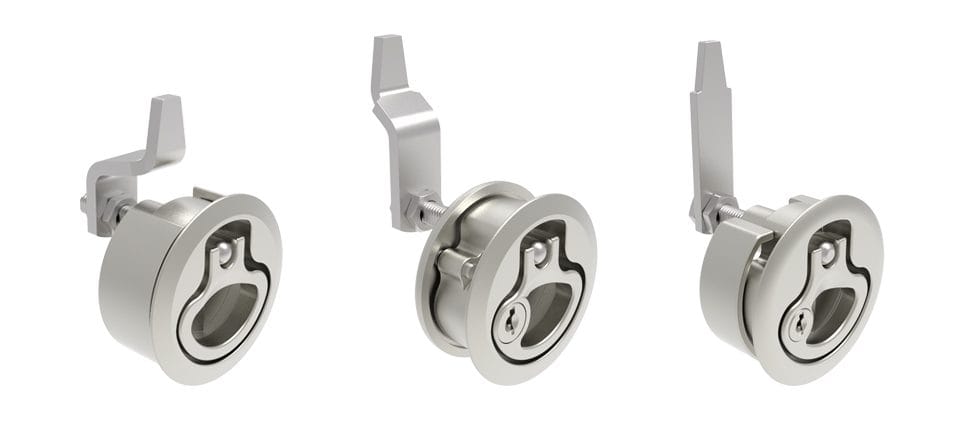
Compression Latches: Designed to put pressure on the door, pulling it securely closed. Ideal for applications requiring soundproofing or weather sealing.
Analogy
A tubular latch functions similarly to a ballpoint pen—pressing on the door knob retracts the bolt just like pressing on the pen tip exposes the writing point.
Tubular Latches vs Cam Latches
Tubular Latches: The Standard Choice for Hotel Doors
Tubular latches are widely recognized as a reliable option for hotel door hardware. Here’s what you should know:
Structure: Composed of a rectangular steel tube with a spring-loaded follower and a triangular latchbolt.
Functionality: The latchbolt retracts when operated by a doorknob or handle, ensuring smooth door operation.
Installation: Designed to be morticed into the door, which simplifies the installation process—requiring only one drilled hole.
Popularity: Ideal for hotel environments due to their straightforward installation, making them suitable for both professional installers and DIY enthusiasts.
Variety: Available in multiple sizes, shapes, finishes, and quality levels to match any hotel aesthetic.
Pro Tip: Tubular latches are perfect for hotels looking for an efficient balance between functionality and design.
Cam Latches: Versatile Options for Security Enclosures
Cam latches serve as versatile fasteners suitable for various applications in hotels:
Components: Comprised of two parts—the cylindrical cam and the body that holds it.
Operation: Rotating the cam engages or disengages it from the body, providing easy access.
Applications: Commonly used in cabinets, toolboxes, lockers, and secure enclosures within hotel premises.
Features: Known for being simple, cost-effective, reliable, and versatile in design.
Security Options: Available in both keyed and non-keyed versions to enhance security based on specific needs.
Key Advantage: Cam latches excel in environments requiring frequent access while offering good weather resistance—ideal for outdoor applications.
When selecting between tubular latches and cam latches for your hotel, consider these factors:
| Feature | Tubular Latches | Cam Latches |
|---|---|---|
| Typical Use | Interior doors | Cabinets, enclosures |
| Operation | Door handle or knob | Rotating lever |
| Installation | Morticed into door | Surface-mounted |
| Complexity | Moderate | Simple |
| Security | Varies (can be keyed) | Keyed or non-keyed |
| Weather Resistance | Limited | Good |
| Vibration Resistance | Limited | Good (especially compression types) |
| Cost | Varies (economy to high-end) | Generally cost-effective |
Making the Right Choice
For hotel interior doors: Choose tubular latches for a blend of aesthetics and functionality.
For cabinets or industrial applications: Opt for cam latches when simplicity and weather resistance are priorities.
Consider traffic levels: In high-traffic areas of hotels, tubular latches may wear out faster than more robust options like cam latches.
By understanding the strengths of both tubular and cam latches, you can make informed decisions tailored to your hotel’s specific needs while enhancing security and user experience.
Tubular Latches vs Compression Latches
Understanding Tubular Latches
Tubular latches are widely used in hotel doors due to their simplicity and effectiveness. These latches are typically morticed into the door, allowing operation via a handle or knob.
Key Components of a Tubular Latch:
- Rectangular steel tube
- Spring-loaded follower
- Latchbolt or ‘tongue’ (triangular metal)
How It Works: When the handle is turned, the latchbolt retracts to open the door; it then springs back to close, ensuring the door remains secure.
Why Choose Tubular Latches for Hotels?
- Easy Installation: Requires only one drilled hole.
- Cost-Effective: Available in various quality levels to suit any budget.
- User-Friendly: Favored by hotel maintenance staff for quick replacements.
Exploring Compression Latches
Compression latches are ideal for enhancing security in environments where a tight seal is crucial. They create a clamping force between surfaces when closed, making them suitable for specific hotel applications.
Key Features of Compression Latches:
- Apply pressure when engaged
- Create a tight seal against dust and moisture
- Minimize rattling and vibrations
Benefits for Hotels:
- Protect against environmental factors, enhancing guest comfort.
- Ideal for outdoor equipment storage or high-traffic areas requiring durability.
When selecting the right latch for hotel applications, consider the following:
| Feature | Tubular Latches | Compression Latches |
|---|---|---|
| Primary Use | Interior doors | Equipment enclosures & outdoor use |
| Mechanism | Spring-loaded latchbolt | Compression force |
| Installation | Simple (one drilled hole) | More complex fitting may be required |
| Sealing | Limited | Excellent (often used with gaskets) |
| Vibration Reduction | Minimal | Significant |
| Typical Applications | Residential & commercial interiors | Industrial & outdoor environments |
Choosing between tubular and compression latches depends on your hotel’s specific needs:
Tubular Latches: Best for standard interior doors needing a simple, cost-effective solution.
Compression Latches: Ideal for applications requiring enhanced sealing, vibration reduction, and protection against environmental factors.
Both types offer unique strengths; selecting the right one ensures optimal security and functionality in your hotel environment.
Choosing the Right Bolts and Latches for Hotel Doors
Selecting the appropriate locking mechanisms for hotel doors is essential for ensuring guest safety and operational efficiency. Here’s a breakdown of the best options tailored to various areas within your hotel:
Guest Room Doors
- Main Locking Mechanism: Utilize a tubular latch paired with a deadbolt for enhanced security.
- Consider Smart Locks: Advanced options like RFID or keyless entry systems can offer convenience and increased security.
Public Restrooms
- Emergency Access Locks: Implement tubular latches that lock from the inside but allow emergency access from outside. This ensures safety while maintaining accessibility.
Back of House Areas
- Basic Security Needs: For low-security zones, basic tubular latches are adequate. However, consider adding deadbolts in high-security areas to prevent unauthorized access.
Exterior Doors
- Robust Locking Solutions: Ensure all exterior doors are equipped with deadbolts. Adding surface bolts can provide additional protection during off-hours.
Example Application
For a hotel pool gate, installing a self-latching mechanism is crucial for safety, ensuring it locks automatically when closed. In contrast, a basic bolt lock is sufficient for storage room doors where security needs are lower.
Key Considerations When Choosing Hotel Locks
Security Features: Look for locks with anti-pick and anti-drill features.
Ease of Installation: Choose locks that simplify installation processes to reduce downtime during upgrades or repairs.
Durability: Select high-quality materials that withstand heavy usage typical in hospitality environments.
By focusing on these critical aspects, hotel operators can enhance both security and guest satisfaction while optimizing their locking systems for modern needs.
Be-tech Locks: Your Trusted Partner for Hotel Door Lock Solutions
At Be-tech Locks, we understand the unique security needs of the hospitality industry. Our comprehensive range of hotel door lock systems incorporates cutting-edge technologies to ensure guest safety and satisfaction. From RFID hotel locks to integrated smart lock systems, we offer tailored solutions for every door in your hotel.
Our team of experts is dedicated to guiding you through the hotel lock procurement process, helping you select ideal combinations of bolts, latches, and smart technologies to create secure guest experiences. Trust Be-tech Locks to be your partner in hotel security.
Relevant Links
For further insights on enhancing your hotel’s security solutions with advanced locking mechanisms, check out these resources:
By understanding and implementing these insights about bolts and latches, you can significantly enhance your hotel’s security framework while ensuring guest satisfaction remains paramount.


